
Happy belated birthday to Thandiwe Newton, who turned 50 last Sunday. From Flirting (1991) to God's Country (2022), the British actress has impressed across a variety of genres and roles, be they prestige melodrama or pulpy sci-fi. There's a tremendous flexibility to her screen presence, a vast range showcased even in projects that never quite rise to her level. Such is the case of Crash, Paul Haggis' divisive Best Picture winner, where Newton is just one thread within a broad tapestry of tricky racial dynamics, each storyline intertwining with ten others. Hyperlink cinema was all the rage in the 00s, and this particular example surely propelled Newton closer to the Oscar race than she'd been before or since.
Though it's no fun to look back on Crash, we shouldn't let the picture's general awfulness bleed into the memory of Newton's work. She's a beacon of quality, shining brightly amid the offensive generalizations which crash into sanctimonious incompetence…
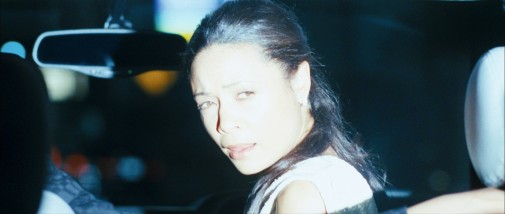
Newton's Christine is introduced in one of the movie's most uncomfortable scenes, a sexual assault in which a racist cop unloads his anger on an unsuspecting victim. Sergeant John Ryan (Matt Dillon) is a bigoted man, fed up and vengeful, thanks to a recent phone call with his father's insurance adjuster. In other words, he's looking for someone to punish. He jumps at the first opportunity to wave around his state-sanctioned authority like a weapon of retribution. That chance manifests quickly as an expensive SUV drives by, not unlike the one that's just been reported stolen from the LA District Attorney in a car-jacking incident.
It's not the same car and the license plates don't match, Officer Ryan's partner immediately points out. For the furious cop, however, facts don't matter when he's looking for somebody to hurt. That someone is Christine, who's just been spotted performing oral sex on her husband, Cameron (Terrence Howard), while he drove. The police lights catch her en flagrante delicto, and yet, against all reason, the TV director and his wife seem initially unbothered by the situation, still coming down from their shared euphoria, all naughty smiles, and conspiratorial giggles.
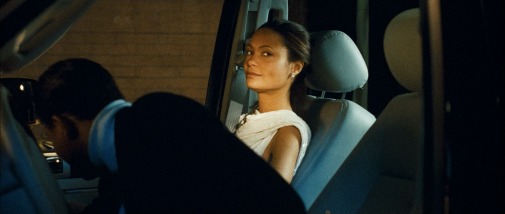
Newton's the first to hint at the scene's growing tension, her gaze hard, almost challenging, as she stares Ryan down. The seeds of outrage are planted, defiance bursting from the earth, and flowering in a show of anger. Cameron mentions his spouse has had a few drinks, trying to appease the officer and defend the woman whose countenance suggests little in the ways of inebriation.
Newton doesn't play the lingering effects of a few too many drinks. Instead, she foregrounds the temper of someone overcome by indignation at her unfair treatment. The swiftness of her mood change hints at a knowledge of where this is going, the traumatic horror to come. Fury mingles with fear, genuine terror as Ryan violates her. In an interview with Vulture, Newton spoke about the shooting of Crash and how she didn't quite understand, not until the day of shooting, that the cop's actions would become so invasive. Moreover, as this was one of the last scenes she filmed, the gravity of the situation didn't inform the character's subsequent arc.
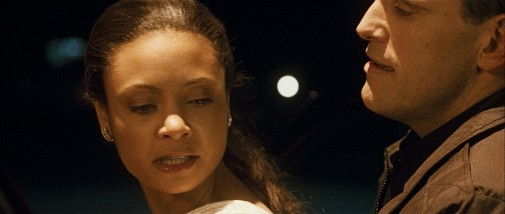
On the first read, the script's ambiguity led her to believe that later confrontations between husband and wife were laced with irony, exaggeration used as a weapon in the marital strife of Cameron and Christine. In retrospect, the actress has said that she wouldn't have even been able to talk after going through such an ordeal. That disconnect between the actress and what ended up on-screen shades the performance, explaining some of its more inauthentic details. However, there's a clearheaded honesty to Newton's handling of the first scene that somewhat compensates.
As Sergeant Ryan's hands stray where they should have never strayed, Christine shuts down in startling ways. Sure, there's a flash of disdain towards her powerless husband, but the main idea that comes across is one of shocked oblivion. Her entire body drains of fight, her eyes go dead, until all that's left on-screen is a specter. But of course, none of that is there when the couple's back at home, breathing life into Haggis' horrid script with all the gusto of two thespians spouting Ibsen on stage.

Newton doesn't hold back, every inch of her energized by a nervous electrical current looking for any outlet so it can explode. It's like we're seeing the culmination of years' worth of arguments, a growing mountain of old resentments. That mountain turns into an avalanche, swallowing the arguing duo. One of Newton's best qualities as a performer has always been her ability to portray mercuriality on-screen, and scenes like this tempestuous argument make that evident.
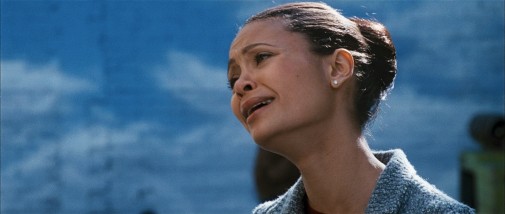
Later we witness a morning after full of regret and remorse, bruised pride subsumed as Christine tries to connect to Cameron through her pain. The dialogue is awful and depends singularly on the actors' balancing energies. On the one side, we have Terence Howard's undemonstrative stoicism, a closed-off wall of shame imploding. Newton, in contrast, explodes with over-emotion, apologetic gestures unraveling into tears, recrimination spewing in every direction. Christine's last big moment is also Crash's most famous scene, a fiery car accident that finds her at the mercy of the violent cop for the second time.
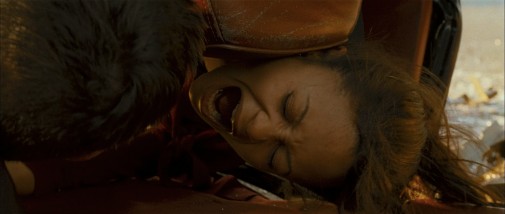
However, the situation is quite different, the character's intentions altered by a new context in which Sergeant Ryan, for once, is trying to save a citizen. For her part, Christine is helpless and panicking, trapped by a wrecked vehicle and in the presence of the racist monster. Between convulsing sobs and the possibility of being burned alive, Newton articulates a veritable rhapsody of contradictory feelings. There's the relief of being aided underlined by the realization of who saved her, a cold acknowledgment of pain unending. The film's construction posits the look shared between Christine and Ryan as a point of connection, opening up the possibility for the cop's redemption arc.
That reading, however, depends on the writing and the ethereal score, rather than Newton's ambiguous stare. Ultimately, the actress maintains authority over the character, denying the camera an easy resolution to her story. She's too good for the picture, anyway.
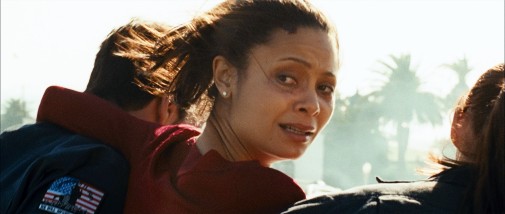
Thanks to her performance as Christine, Newton was nominated for several awards, both as part of the ensemble cast and in supporting actress categories. Indeed, she won the BAFTA and remains the last woman to win that prize without securing a nomination from AMPAS. Though Crash went on to win Best Picture at the Oscars, its only acting nomination went to Matt Dillon. As for the Best Supporting Actress race, the Academy chose Amy Adams in Junebug, Catherine Keener in Capote, Frances McDormand in North Country, Rachel Weisz in The Constant Gardener, and Michelle Williams in Brokeback Mountain. Weisz won the prize, while Thandiwe Newton remains without a nomination.
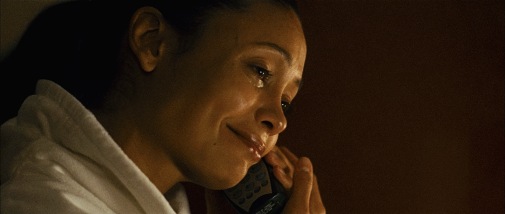
Crash is streaming on HBO Max. You can also rent it on various other platforms...